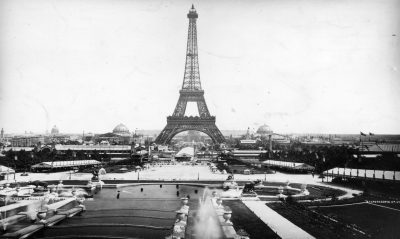HIST 2508A: France Since 1889
Winter 2021
Instructor: Prof. Susan. Whitney
Course introduction: This course examines the history of France since 1889, when France marked the centenary of the French Revolution and hosted the World’s Fair. The Eiffel Tower, pictured above, was built for the World’s Fair.
At the end of the nineteenth century, France was one of the world’s great powers and its capital Paris attracted tourists, intellectuals, writers, artists, and performers from across the globe. The French empire was second only to the British empire in size and Paris was regarded as the capital of global culture. Artists from across North America and Europe travelled to France to learn their craft and exhibit in the company of such modern masters as Monet, Van Gogh, Renoir, and, later, the Spaniard Pablo Picasso, who spent most of his artistic life in Paris. A century later, France’s position in the world had altered considerably as a result of two world wars, the rise of the United States and the Soviet Union as nuclear superpowers, and wars of independence in colonial Algeria and Indochina. Yet, even as French global power diminished, French leaders such as General Charles de Gaulle promoted the idea of French grandeur, and France retained a place in the imaginations and dreams of peoples around the world. Before covid-19 temporarily halted global travel, France was the world’s most visited country and the Eiffel Tower one of the world’s most iconic buildings. When Notre Dame cathedral burned in 2019, people across the globe mourned the destruction of one of the world’s architectural treasures.
Course description: This course introduces students to the key topics, themes, and problems that have absorbed historians writing the history of twentieth-century France. It begins in the late nineteenth century and pays special attention to the major developments that have shaped twentieth-century French history. Examining how the French have remembered and commemorated two world wars and the country’s complicated colonial past will be central concerns of the course, just as they have been central preoccupations of twentieth-century French life. Other important topics to be examined include: the impact of two world wars on French social, political, economic, and cultural life; French responses to the rise of American political, military, economic and cultural power; the nation’s complicated relationship to empire and, after 1945, to post-colonial states and peoples; the emergence of a new youth politics in the 1920s and 1930s and an international youth culture in the 1960s; the rise and subsequent defeat of fascism in the 1930s and 1940s; the emergence of the welfare state; and the economic downturn of the 1970s and the return of far-right politics in the 1980s. The course will also touch on the complex roles that art, culture, fashion, cuisine, and tourism have played in French identity, culture, and economic life.
Course format and evaluation: At this point, early June 2020, it is not yet known whether the course will be offered in person or online. If offered in person, the course will be divided into a two-hour lecture and a one-hour discussion group during which students will discuss assigned readings and course assignments. In the past, course work and evaluation have been organized in the following manner:
- 10% Discussion group attendance
- 10% Discussion group participation
- 10% Paper proposal and annotated bibliography
- 30% Paper
- 40% Final exam during the regularly scheduled exam period
If offered online, the precise format will be determined by December and will depend partly on enrolment. Regardless of format, it is highly likely students will be expected to complete a research paper on a subject of their choice, as well as a proposal and annotated bibliography for the research paper. Please see the description below for further information about the paper.
Information on the research paper: The research paper asks students to analyze contemporary newspaper coverage of an event in French history in relation to subsequent historical scholarship on the topic. To put it another way, how did journalists writing at the time an event happened evaluate the event and its importance – and how did this compare to how historians analyzed the same event decades later? Detailed instructions on all steps of the paper will be provided. Students with a reading knowledge of French will be encouraged to use French newspapers, which are freely available on the French national library’s Gallica website, for their assignment.
Questions? If you have any questions about the course, please email Professor Whitney at Susan.Whitney@carleton.ca
